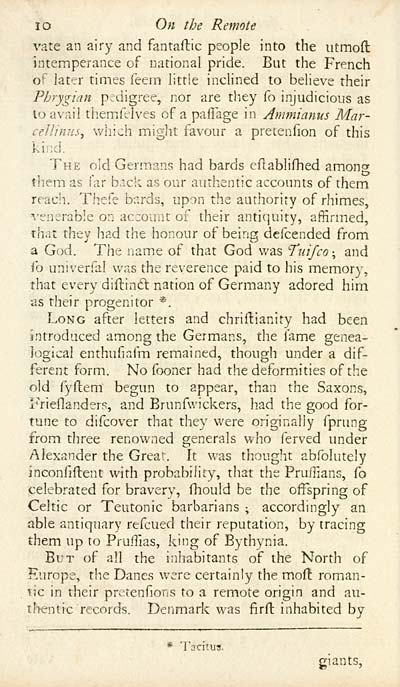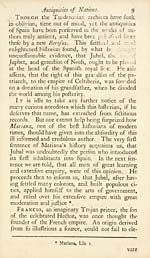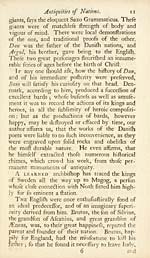Blair Collection > Critical dissertations on the origin, antiquities, language, government, manners, and religion, of the antient Caledonians, their posterity the Picts, and the British and Irish Scots
(48)
Download files
Complete book:
Individual page:
Thumbnail gallery: Grid view | List view

lo On the Remote
vate an airy and fantaftic people into the utmoft
intemperance of national pride. But the French
of later times feem little inclined to believe their
Phrygian pedigree, nor are they fo injudicious as
to avail themfclves of a paffage in Ammianus Mar-
cellinusj wliich miglit favour a pretenfion of this
kind.
The Old Germans had bards eftablifhed among
them as far back as our audientic accounts of them
reach. Thefe bards, upon the authority of rhimes,
venerable on account of their antiquity, affirmed,
that they had the honour of being defcended from
a God. The name of that God was Tiiifco ; and
ib univerfal was the reverence paid to his memory,
that every diflindl nation of Germany adored him
us their progenitor *.
Long after letters and chrillianity had been
introduced among the Germans, the fame genea-
logical enthufiafm remained, though under a dif-
ferent form. No fooner had the deformities of the
old fyftem begun to appear, than the Saxons,
I'rieflanders, and Brunfv.-ickers, had the good for-
tune to difcover that they were originally fprung
from three renowned generals who ferved under
Alexander the Grear. It was thought abfolutely
inconfiftent with probability, that the PruiTians, fo
celebrated for bravery, fhould be the offspring of
Celtic or Teutonic barbarians ; accordingly an
able antiquary refcued their reputation, by tracing
them up to PruiTias, king of Bythynia.
But of all the inhabitants of the North of
Kurope, the Danes were certainly the moft roman-
lic in their pretenfions to a remote origin and au-
thentic records. Denmark was firft inhabited by
* Tncitus.
giants,
vate an airy and fantaftic people into the utmoft
intemperance of national pride. But the French
of later times feem little inclined to believe their
Phrygian pedigree, nor are they fo injudicious as
to avail themfclves of a paffage in Ammianus Mar-
cellinusj wliich miglit favour a pretenfion of this
kind.
The Old Germans had bards eftablifhed among
them as far back as our audientic accounts of them
reach. Thefe bards, upon the authority of rhimes,
venerable on account of their antiquity, affirmed,
that they had the honour of being defcended from
a God. The name of that God was Tiiifco ; and
ib univerfal was the reverence paid to his memory,
that every diflindl nation of Germany adored him
us their progenitor *.
Long after letters and chrillianity had been
introduced among the Germans, the fame genea-
logical enthufiafm remained, though under a dif-
ferent form. No fooner had the deformities of the
old fyftem begun to appear, than the Saxons,
I'rieflanders, and Brunfv.-ickers, had the good for-
tune to difcover that they were originally fprung
from three renowned generals who ferved under
Alexander the Grear. It was thought abfolutely
inconfiftent with probability, that the PruiTians, fo
celebrated for bravery, fhould be the offspring of
Celtic or Teutonic barbarians ; accordingly an
able antiquary refcued their reputation, by tracing
them up to PruiTias, king of Bythynia.
But of all the inhabitants of the North of
Kurope, the Danes were certainly the moft roman-
lic in their pretenfions to a remote origin and au-
thentic records. Denmark was firft inhabited by
* Tncitus.
giants,
Set display mode to: Large image | Transcription
Images and transcriptions on this page, including medium image downloads, may be used under the Creative Commons Attribution 4.0 International Licence unless otherwise stated. ![]()
| Permanent URL | https://digital.nls.uk/76287139 |
|---|
| Description | A selection of books from a collection of more than 500 titles, mostly on religious and literary topics. Also includes some material dealing with other Celtic languages and societies. Collection created towards the end of the 19th century by Lady Evelyn Stewart Murray. |
|---|
| Description | Selected items from five 'Special and Named Printed Collections'. Includes books in Gaelic and other Celtic languages, works about the Gaels, their languages, literature, culture and history. |
|---|

